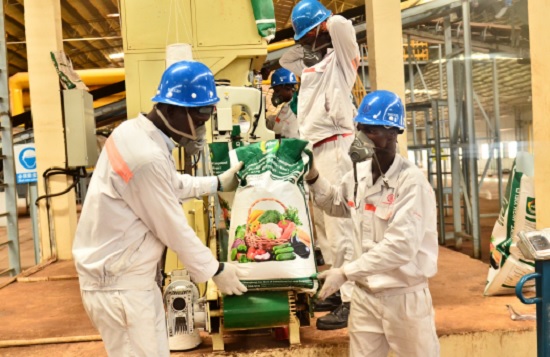
Studies show Uganda has one of the highest soil nutrient depletion rates in the world
Kampala, Uganda | RONALD MUSOKE | The African Development Bank Group’s Board of Directors has approved a project that seeks to procure 60,000 metric tonnes of fertilizer for 400,000 Ugandan smallholder farmers over the next three years.
The project from which the Ugandan smallholder farmers are going to benefit was approved on Sept. 22 and it seeks to advance the Bank’s Feed Africa Strategy by increasing food productivity and security. It also builds on the results of the Sustain Africa initiative, the Bank’s Country Strategy Paper for Uganda 2023–2026, and its Technologies for African Agricultural Transformation Programme.
The Ugandan farmers are benefitting from the Fertilizer Financing for Sustainable Agriculture Management project which is under the Africa Fertilizer Financing Mechanism an instrument which has been running since 2015 across Africa and is intended to boost agricultural productivity.
The project will provide US$2 million (Approx. Shs 7.5 billion) in partial trade credit guarantees and a grant of US$877,842 (Approx. Shs 3.3 billion) to the African Fertilizer and Agribusiness Partnership, a non-profit social enterprise that collaborates with public and private sector partners to develop and strengthen inputs value-chains and, in particular, to deepen and broaden fertilizer markets across Africa.
Over the next three years, the project will support two wholesalers to sell fertilizer with a value of up to fifteen times the value of the US$2 million partial trade credit guarantee. It will also link wholesalers to 25 hub agro-dealers and 125 retail agro-dealers who will on-sell the fertilizer to farmers.
According to a statement sent to The Independent on Oct.12, the credit facility will reduce the risks associated with suppliers lending fertilizers to wholesalers on credit. The project is expected to boost yields and will also provide training to 3.4% of targeted farmers, 40% of them women on using improved seeds, balancing crop nutrition and best farming practices.
Deteriorating Ugandan soils
The AfDB fertilizer project comes at a time when studies are showing Uganda to have one of the highest soil nutrient depletion rates in the world. According to a 2018 report from the International Fertilizer Development Centre (IFDC), the soils in Uganda are depleted at an average of 80kg of nutrients per hectare annually. On the other hand, Ugandan farmers hardly use inorganic fertilizers on their farms with some estimates showing average fertilizer application being about 1kg per year.
Agricultural experts attribute this to the high cost and lack of information and technical advice on its use. Just 8% of households use fertilizers and at low application rates. A major constraint is poor knowledge at the farm level on the benefits of fertilizer and agronomic practices required to achieve high productivity.
Fertilizer has been and continues to be a key ingredient in intensified agricultural systems and has helped farmers in other parts of the world overcome constraints and improve aggregate production. Over 70% of smallholder farmers in Uganda practice subsistence agriculture with limited incomes and poor purchasing power to stimulate effective demand.
“In Uganda, the fertilizer consumption is about 2.5 kg/ha. The project will help to make fertilizer more accessible and appropriately used by farmers, which would in turn boost agricultural productivity and help to improve food security in Uganda,” said Marie Claire Kalihangabo, the Africa Fertilizer Financing Mechanism Coordinator.
The Africa Fertilizer Financing Mechanism was formally created in 2008 and became operational in 2015. The African Development Bank’s Board of Governors extended its lifespan to 2032.
Its primary mission is to create an enabling environment for mobilizing the investments needed to achieve the target of 50 kilograms of fertilizer nutrients per hectare, as instructed by the 2006 Abuja Declaration on Fertilizer for an African Green Revolution.
 The Independent Uganda: You get the Truth we Pay the Price
The Independent Uganda: You get the Truth we Pay the Price





